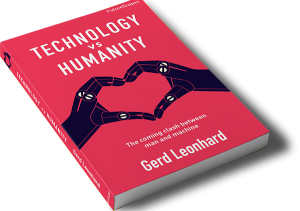Technology vs. Humanity

Gerd Leonhard’s book “Technology vs Humanity”
A review of the latest book by Gerd Leonhard, futurist, keynote speaker and author. I’ve been writing about technology for many, many years and along the way I’ve come to the conclusion that guru-type predictions tend to be pretentious and all too often they turn out to be wrong.
Therefore when I bought “Technology vs. Humanity”, I was somewhat skeptical, but that subjective, ill-informed impression went in a matter of minutes.
Had I been better informed, I would have realised that the author, Gerd Leonhard, was a highly respected futurist, keynote speaker and author who supplies visionary insights and concentrated wisdom that informs key decisions makers.
This is a brilliant, 180-page book. It is beautifully written, so easy to read that I found it hard to put it down. So, let’s cut to the chase. I tried but I couldn’t top these words. “Technology vs. Humanity is a last-minute wake up call to take part in the most important conversation humanity may ever have. Will we blindly outsource and abdicate big chunks of our lives to the global technology companies – or will we take back our autonomy and demand a sustainable balance between technology and humanity?”, says Bob Emmerson, freelance writer and telecoms industry observer.
That is a huge topic, which the author covers in twelve chapters. Chapter 2: “Tech vs Us” covers a key issue: technology knows no ethics, norms, or beliefs, but the effective functioning of every human and every society is entirely predicated upon them. So what happens when technology goes on expanding exponentially while humans progress linearly? Do we lose control? If that sounds far fetched consider the fact that we are already grappling with some rapidly escalating issues, such as the constant tracking of our digital lives, surveillance-by-default, diminishing privacy, the loss of anonymity, digital identity theft, data security, and much more.

Gerd Leonhard
The author argues that we are at a 90/10 point right now: 90% of the amazing possibilities presented by technology could play out well for humanity, while 10% might already be troublesome or negative. Dramatic changes would result if that 10% grows to 50% or more and very powerful technology forces are driving that development.
Computers will surpass the processing power of a single human brain by 2025 and a single computer may match the power of all human brains combined by 2050. Therefore there is an enormous gap between what technology can do (the answer seems to be pretty much anything), and what it should do to result in overall human happiness. We must look beyond profit and growth when it is about technology that can dramatically alter human existence.
Chapter 5: “The Internet of Inhuman things”. It examines the potential challenges posed by the IoT, which is the current dominant narrative within digital transformation, with thousands of corporate strategies riding in its slipstream. If the IoT delivers on its promise, we could realise savings of 30–50% on global logistics and shipping costs; 30–70% of the costs of personal mobility and transportation; 40–50% of energy, heating, and air-conditioning expenses. But will efficiently trump humanity?
The IoT is bound to be orders of magnitude more powerful than the human Internet of today, and therefore infinitely more likely to cause unintended consequences. The outcome of global deployment could be heaven or hell, but either way the compass for this journey is being calibrated right now.
Chapter 7: “Digital Obesity”, which he defines as a mental and technological condition in which data, information, media, and general digital connectedness are being accumulated to such an extent that they are certain to have a negative effect on health, well being, happiness, and life in general. Moreover exponential technologies that seem to make our lives easier, that play on our natural laziness and our need to be liked are highly addictive and often have a drug-like effect. Habits form very quickly.
Do you check your email one more time before going to bed? Do you feel “alone” when not connected to your favorite social network, and defenseless without Google maps or your messaging apps?
Chapter 12: Decision Time. In this closing chapter the author argues that it’s crunch time for tech adoption—not the application of technology itself, but the deeper integration and delineation of technology in human life. Numerous ethical, economic, social, and biological issues will simply not wait for another forum or the next generation. It’s time to regulate mass technology application just as we would any other transformational force such as nuclear power.
This is not the conclusion of a rich dialogue, but the beginning of a conversation that needs to become mainstream in our media, our schools, our government, and—most immediately—our boardrooms. The time for technologists and technocrats to simply hand the ethical buck over to someone else has passed.

Bob Emmerson, freelance writer and telecoms industryobserver
Conclusion: We are heading into a future where literally everything around us is impacted by a tsunami of technological advances, yet the way we frame the world, the way we evaluate what is right or wrong, the way we decide whether to engage and use a certain technology or not is still based on past experiences, on old frameworks, and worst of all, on linear thinking. Our ethics—and many of our laws and regulations as well—are still based on a world that advances linearly and on “what used to work”.
Ever since the Internet became a significant commercial force, we seem to have focused in the main on exploiting its economic and commercial promises. We have spent way too little time considering its impact on our values and ethics—and this is finally becoming apparent as we enter the age of artificial intelligence (AI), robotics, and human genome editing.
The author cites the need to establish a Global Digital Ethics Council. The book demonstrates why that need is overwhelming, but who will set it up? Silicon Valley? They could but they would be eating their own lunch. The UN? Their track record is abysmal.
Technology vs. Humanity can be ordered on line at http://www.techvshuman.com/. Price US$15.95 (paperback); $US9.95 (pdf). In addition there is a free preview. I also suggest paying a visit to a related site: http://www.onteamhuman.com
The author of this blog is Bob Emmerson, freelance writer and telecoms industry observer
Comment on this article below or via Twitter @IoTGN
